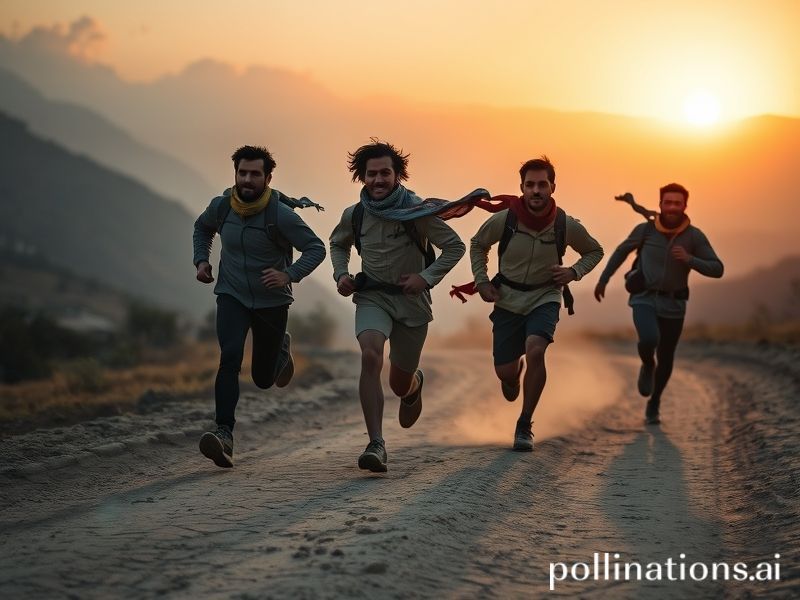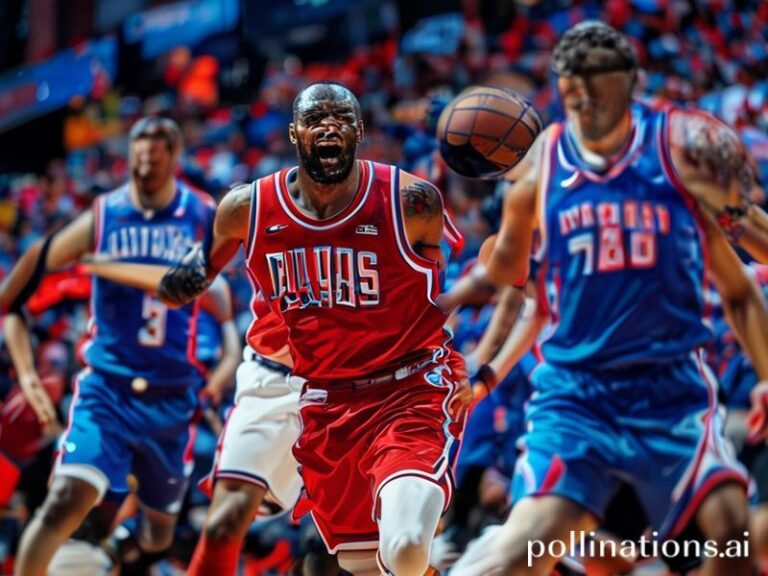Jet-Set Hunger Games: How Celebrity Backpacking Became the World’s Guiltiest Pleasure
The Jet-Set Hunger Games: When “Celebrity Race Across the World” Becomes a Passport to Our Collective Guilt
By the time the private-jet fumes had dissipated somewhere over the Azores, the first Instagram post had already gone viral: a selfie of a British pop star pouting beside a broken-down tuk-tuk in rural Laos, captioned “Finding myself 🌏 #grateful.” Thus began the latest iteration of “Celebrity Race Across the World,” the franchise that maroons pampered A-listers on a shoestring budget and dares them to reach Ushuaia before their publicists file involuntary-bankruptcy papers on their behalf. The conceit is simple: no business class, no handlers, no gluten-free macrobiotic snacks flown in from Malibu. Just grit, local transport, and the crushing realization that Wi-Fi in the Hindu Kush is patchy.
International audiences—already punch-drunk from war, plague, and whatever Elon is tweeting this morning—have latched onto the show as a sort of geopolitical stress ball. In São Paulo’s dive bars, patrons roar when an Oscar-winning actress bargains in phonetic Spanish for a hammock on a Colombian cargo boat. In Seoul, office workers place lunchtime bets on which influencer will cry first upon discovering that Rwandan minibuses don’t recline. The spectacle offers a perverse comfort: see, the ultra-wealthy also suffer—although their suffering is conveniently televised and monetized.
But zoom out and the race starts to look less like escapism and more like a fun-house mirror reflecting our unequal planet. Every checkpoint—Hanoi, Timbuktu, Tierra del Fuego—doubles as a data point in the global inequality index. When a TikTok chef barters a signature hot sauce for a bed in a Syrian refugee camp, you can almost hear the UN Sustainable Development Goals quietly sobbing in the corner. The show’s producers insist they’re “raising awareness.” Critics counter that awareness rarely survives the edit suite; what airs is the 90-second montage of “authentic” hardship sandwiched between adverts for Swiss watches and carbon offset schemes—many of which are, ironically, owned by the same parent conglomerate.
Then there’s the carbon elephant in the room—though “elephant” undersells it; this is more of a methane-belching blue whale. Each contestant’s eventual flight home wipes out whatever ecological penance they accrued by hitchhiking on yak-back across Mongolia. The finale’s confetti cannon might as well launch chunks of melting glacier. Yet the irony is delicious: audiences who furiously retweet Greta Thunberg also binge-watch millionaires race through flood zones that the viewers themselves may never be able to afford to flee.
Diplomatically, the race functions as accidental soft power. When a K-pop idol charms her way onto a Ghanaian fishing boat, bilateral mentions on Ghanaian Twitter spike 400%. The French foreign ministry quietly notes that applications for tourist visas surged after last season’s Bordeaux-to-Bishkek leg. Some governments now court the production like it’s the Olympics with fewer human-rights headaches. Kazakhstan even waived visa fees, hoping the world would forget Borat and remember… well, whatever Instagram filter the celebrities use in Almaty.
Of course, the real winners are never the contestants but the streaming platforms, which harvest eyeballs and data like a combine harvester running on schadenfreude. Meanwhile, local economies along the route receive a sugar-rush of cash—guesthouses booked, SIM cards sold, translators hired—followed by the inevitable crash when the circus packs up. One Nepalese teahouse owner told me, “They paid me double to serve yak-butter tea with a smile. After they left, my regular customers complained the price stayed double.” Fame, like altitude sickness, lingers longer than expected.
As the credits roll on this season, the celebrities will return to their gated villas, armed with fresh anecdotes and slightly less gullible immune systems. Viewers will scroll on to the next dopamine drip. Somewhere, a Laotian tuk-tuk driver will still be trying to charge his phone with a solar panel donated by a departing production assistant, wondering if the world has mistaken poverty for picturesque. And somewhere else, a marketing executive is already pitching “Civilian Race Across the World,” where ordinary people compete for medical debt relief.
Sleep tight, planet Earth. The race continues, even when the cameras stop rolling—only the stakes are higher and the finish line keeps moving.







